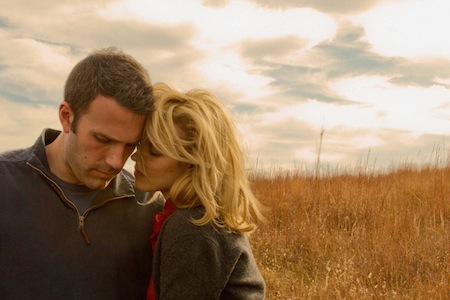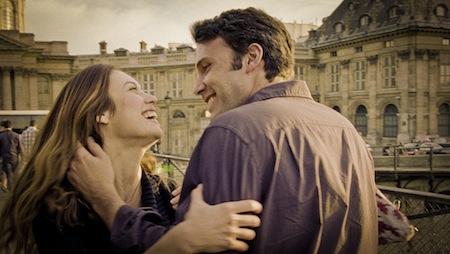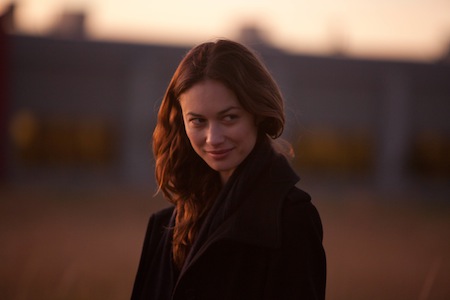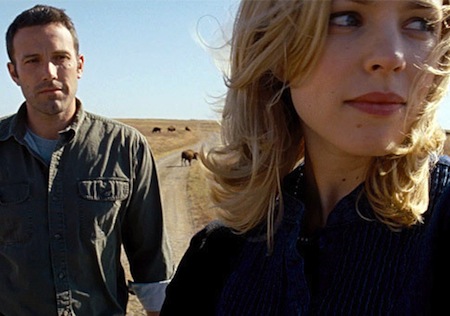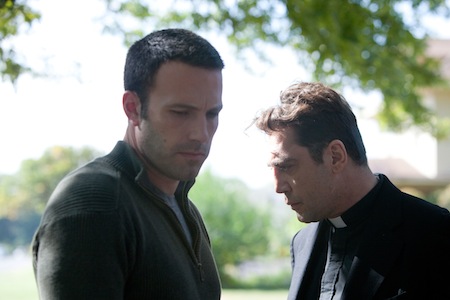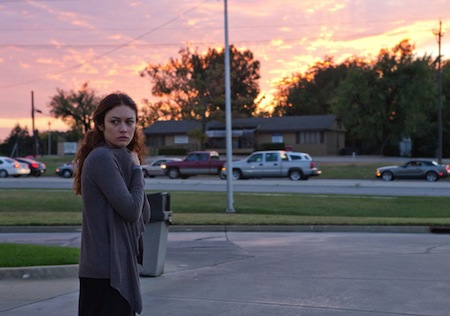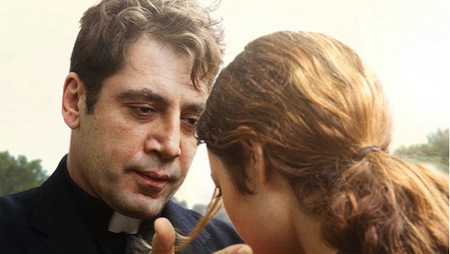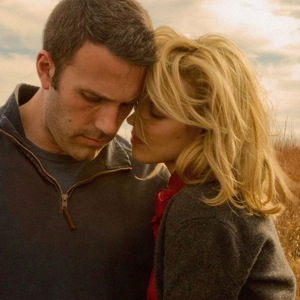To The Wonder Review & Press Conference
Terrence Malick’s ‘To The Wonder’ starring Ben Affleck, Rachel McAdams, Javier Bardem and Olga Kurylenko looks at the physical and metaphysical nature of love with extraordinary breadth and craftsmanship.
‘To the Wonder’ is only Terence Malick’s 6th feature film in a career that started auspiciously with Badlands in 1973. It is a powerful exploration of the nature of love. In ‘To The Wonder’ Malick gives the viewer a cinematic experience with an emotional power rarely achieved on screen. From this privileged view, we become more than just voyeurs, “looking in”. Malick has raised the bar once again for what film as an art form can do.
In ‘To The Wonder’ Malick gets as close as one can get to moving us out of our theatre seats without gimmicks. The dialogue between characters is deliberately muted in service of visual context, to the embodiment of the characters and their physical reaction to one another. His experimentation with the relationship between camera and dialogue, begun with Days of Heaven (1978), reaches a new level of maturity and craft. His shots often delicately balance the reaction of the characters to one another simultaneously in the depth of the frame. We are given a slow deliberate pacing of the simplest of movements – climbing stairs, walking a hallway, unpacking a box – in anticipation of some sort of denouement or revelation, or not. We are also treated to sweeping landscapes, skies, beaches, but never out of the frame are the particular and immediate moments and things that we often overlook – the pollen in the flower, the light and shadow through a window or in one particular instance, the warmth to touch on a pane of stained glass in a church. Malick raises the camera to that of a metaphysical messenger, a cinematic angel purveying and protecting what is ‘real’, what is ‘important’.
In an early scene, in a moment of euphoric embrace with the sky and all that materially envelops her, the film’s protagonist Marina (Olga Kurylenko) speaks of a “love that loves us”. A poetic stream of consciousness continues from Marina as Neil (Ben Affleck) enters the frame in a way only Malick can introduce a character, in parts, and only in reaction to a world neither Marina’s nor Neil’s alone but that which belongs to the viewer as well.
And what is important? About the only traditional theme in this so-called ‘romance-drama’ is the love triangle. An on again and off again relationship between Marina and Neil is interrupted by Neil rekindling an acquaintance with Jane (Rachel McAdams). Neil seems more comfortable with the familiar, local beauty Jane. But Neil can’t get the free spirited, very French, Marina out of his system and cannot returnJane’s love and proposal of marriage. Neil is often portrayed as less than committed and Malick has the local Priest Father Quintana (Javier Bardem), having his own crisis of faith, interceding with sermons on the nature of commitment between a man and a woman. Malick beautifully carries these relationships and the love triangle with all the trappings of romantic love: with Marina lush, exquisite shots in Paris and with Jane the sweeping ranch vistas of the mid-west. But Malick redacts these romantic frames with gazes of uncertainty, disappointment and frustration. Romantic love is constantly pressured by the realities and pain of authentic love’s demands: sacrifice, selflessness and forgiveness.
A clue to understanding Malick’s ambitious and somewhat epic exploration of love may be found in the Swiss writer Denis de Rougement’s distinction between ‘romantic’ and ‘active’ love. De Rougement strongly contrasts the eros/ego-centered nature of ‘romantic’ love with that of the selfless unconditional commitment to the other in ‘active’ love. To the Wonder eschews these distinctions in favor of exploring the relationship between them. The film seems to confirm that one can exist within the other but practically it may not work out.
What seems certain for Malick is Marina’s initial observation that somehow there is “love that loves us”. Bartlesville’s priest Father Quintana questions this deeply. He looks around and wonders where is Christ found? In contrast to the romantic dramas of Neil and Marina and Neil and Jane, he sees depravity and need all around him. It shakes him that a God of love has rendered many helpless and lost. A good part of his crisis is his own longing for intimacy. At one point he cannot bear to see a needy parishioner knocking on his door. Malick used the local neighborhoods, church and prison to give this crisis the authenticity it deserves. His camera also frames the less fortunate of Bartlesville with the same respect he gives his romantic leads – as if they we’re instructing him on the nature of love or the lack of it. It is this world and his own palatable need which shakes Father Quintana’s faith.
Perhaps Father Quintana should take a lesson from the Elder Zossima found in Doestoyevsky’s The Brothers Karamazov. Instructing the young monk Alyosha, the hero of this epic novel, Zossima exhorts him to pass up the priesthood and the service of God and not to return until he has experienced the pleasures and pains of personal love, of family and of the world, of, I believe, the “love that loves us” to which Marina refers. We don’t know in the end where Malick’s priest will end up but somehow we know he has understood Zossima’s advice, as we understand Malick’s to look ‘to the wonder’.
It is rare for a filmmaker to have such a singular and recognizable voice as that of Terrence Malick. That the actors’ performances were so effective in the context of the huge subject matter is a credit to their ability to grasp Malick’s unconventional approach to filmmaking. Olga Kurylenko gave a particularly powerful, memorable and convincing performance as Marina. We are indeed very lucky that Malick is making films once again. His Producers tell us that two more films are in the works and given that the Tree of Life was released just last year, this is astonishing given the rare output from Malick in the last 40 years.
To The Wonder goes next to Toronto for its North American Premiere at TIFF.
-Alfredo Romano

